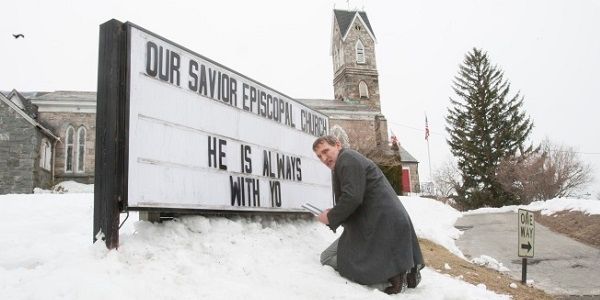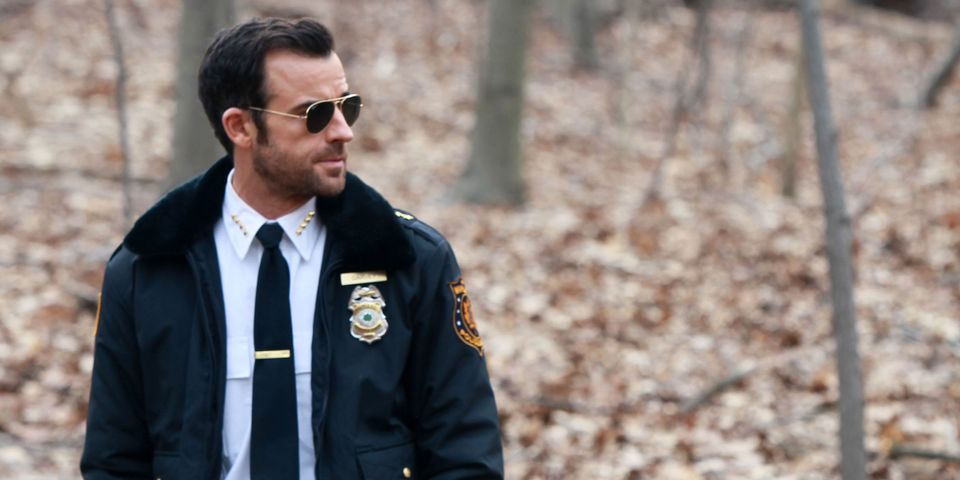Why do bad things happen? How do we deal with calamity? Why is life so uncertain? How does one live in the face of unexpected loss? There are many ways that human beings attempt to answer or avoid these universal questions. In a previous era, Americans might have looked to the Bible for guidance, but today television and cinema tell stories of calamity that millions of Americans collectively watch. It seems as if these stories have become a new scripture, counseling us how to deal with life’s most important questions.
These are the questions of HBO’s The Leftovers. The Leftovers revolves around an unexpected and unexplainable event called “The Sudden Departure.” Two percent of the human population suddenly disappears, and the show charts the aftermath of this event in Mapleton, New York. It follows those who are “left over” and remain behind, those dealing with their loss and pain.
The questions that the show struggles with have been around for all of human existence. In the ancient world the genre of wisdom literature helped people grapple and deal with loss. The same is true of the Old Testament’s wisdom books; they are the genre of difficult questions and deep losses. Similar to The Leftovers, sudden loss forms the backdrop to many of the biblical wisdom figures – Joseph is sold into slavery by his brothers, the impending genocide of Queen Esther’s people, David is hunted by Saul after his defeat of Goliath. It is in these moments of the sudden departure of the good life that wisdom literature speaks powerfully. Can The Leftovers be understood as a wisdom tale? If so, there is perhaps no better story to begin reflecting on The Leftovers with than when a man suddenly loses it all: the story of Job.
The book of Job deals with the question, “Does Job fear God for nothing?” Put to God by Satan, this question asks whether Job will trust, obey, and cling to God if all of the blessings were removed. So God takes away everything from him, his children and his wealth, and leaves him with nothing. Job has nothing, except for his wife and friends who actually work against Job in his struggle to maintain his faith in the Lord. From Job 3 to 37, Job is the one who is “left over,” and he must deal with the sudden departure of his God-given blessings– yet without a word from God. Job 19:1-12 is one of the most graphic descriptions of Job’s troubles – he is crushed, insulted and wronged by his friends; he feels subjected to violence, walled in with pain, on a dark path, stripped of honor, broken down, with hope uprooted, and under siege. And God is responsible for it all.
Job’s experience aptly coincides with that of the characters in The Leftovers. Like Job, the characters in the show are left in their loss and pain without a word from God. The question that both The Leftovers and the book of Job are wrestling with is how to deal with a loss so devastating that it cuts to the core of one’s being or identity. Will Job “curse God to His face” and thus completely change the direction of his life? Can the town of Mapleton find shalom or an answer to this Sudden Departure? The characters either try to move on from their loss the best they can, or join the Guilty Remnant (a local cult) and attempt to force the townspeople to face up to meaning of the Sudden Departure.

There seem to be no answers for either Job or those who remain in The Leftovers, until the end.
In final episode of the first season (“The Prodigal Returns”), Kevin, Mapleton’s Chief of Police, calls Pastor Matt to help him bury Patti (a member the Guilty Remnant). At the burial site Matt gives Kevin a Bible and asks him to read Job 23:8-17. Kevin reads the passage and its description of an important aspect of Job’s perspective within his incredible loss. At this point in the story, Job is caught between his faith in the Lord and his desire to charge God with wrongdoing. It is by no means the final resolution to Job’s calamities; that comes later in Job 38-42 when the Lord speaks to Job. As Kevin reads Job 23:8-17, he pauses in verse 12 on the phrase, “I have not departed.” Although the biblical text refers to Job not departing from God’s commands, for Kevin this sets the whole passage in the context of Kevin being a leftover. Kevin begins to cry as he reads the rest of the passage, for it speaks to the uncontrollable, terrifying and depressing nature of the Sudden Departure. And yet, like Job, it also speaks to how Kevin should not be silenced by deep gloom. Kevin must keep going he must try to keep his hope alive. This scene does not answer the question of how to deal with this deep loss, yet it is not the end of the episode.
Nora, like Job, has lost everything—her husband and her children. She writes Kevin and says, “I am beyond repair. Maybe we’re all beyond repair.” This sentiment summarizes the entire season up to this point. Mapleton is broken, without hope, nihilistic. The whole society has nothing – nothing to live for, nothing to hope for, nothing to create healthy bonds between people, nothing to explain the Sudden Departure, nothing religious to believe in. In this environment, religion in general – or Christianity in particular – is not an option. And in an important symbolic moment in this first season, Pastor Matt loses the church building to the Guilty Remnant. Christianity is literally and figuratively off the map.
Up to this point in the show I thought its message was that the audience must simply recognize that life is about nothing, inexplicably holds no meaning, and that one should just deal with it– whether by avoiding the pain, numbing themselves to it, or seeking refuge apart from society.

However, the last five minutes of “The Prodigal Returns” resists and even shifts the show’s standard direction. Tommy, Kevin’s stepson, is the prodigal that the episode’s title refers to. Previously Tommy was charged by the mysterious Holy Wayne to watch over one of his followers, Christine, who was carrying Wayne’s child. After giving birth, Christine abandons her baby, which Tommy in desperation leaves on Kevin’s front doorstep. When Nora arrives at Kevin’s house to leave her goodbye note (“I am beyond repair …”), she finds the baby. As Kevin and his daughter walk up to the house, Nora, holding the baby in her arms, sees Kevin, smiles and says, “Look what I found.”
Nora found hope. Just as suddenly as two percent of the human population departed and left the world in total despair, so came an unexpected source of hope, albeit only a glimmer. For the leftovers there was a time to weep but now a time to laugh, a time to mourn and now a time to dance (Eccl. 3:4). For Nora, there was a time to give up and to throw away whatever life she had in Mapleton (Eccl. 3:6). There was a time to scream in silence and now a time to speak (3:7b). There was a time for Nora to describe herself as beyond repair, torn apart, but now a time to be sewn together (3:7a). Ultimately, the Preacher (the author of Ecclesiastes) tells us that there is an appointed time for everything (3:1).
However, human beings do not know what time will bring; we have no ultimate control and don’t know what awaits us (9:1). Life and the times of life are temporary, like a vapor, here one moment and gone the next. At the end of Ecclesiastes the Preacher tells the God-fearer to keep God’s commandments and so look in hope and confidence to final appointed time, the time of judgment. This is the ultimate time that Ecclesiastes teaches one to hope for. Yet through this child, The Leftovers provides a hope that is more tangible, but just as unsure, just as dangerous and tenuous. Nora has received a gift of hope as randomly as she lost everything. The episode ends with her smiling, but what about the future? The Leftovers leaves Nora hopeful but still in the midst of this confusing wheel of fortune.
Television and film usually end up telling stories that we want to hear, often reinforcing values we already hold. A TV show that leaves the characters in unredeemable loss with their lives subject to the wheel of fortune would be shocking and interesting, yet in the end, The Leftovers gives us both the loss and the hope. As a wisdom tale The Leftovers counsels us not to think that we will be spared loss and pain, but to hope that relief and deliverance will come in time, even from unexpected or impossible circumstances. Even though we don’t know why things happen that shouldn’t leave us paralyzed and inactive; we must choose to act and hope for better days. Like The Leftovers, life is full of “sudden departures” and the biblical wisdom books provide the perspective and language for those moments.




